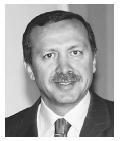TURKEY
Recep Tayyip Erdogan
Prime Minister

(pronounced "re-JEP tie-YEEP ERR-doe-juan")
"This [election victory] is a turning point in the struggle for a democratic state, a state of rights, a just state."
The Republic of Turkey covers an area of 780,580 sq km (301,382 sq mi) in Europe and Asia. Turkey's neighbors include Greece and Bulgaria on the west, Syria and Iraq on the south, Iran on the east, and the former Soviet republics of Armenia and Georgia on the northeast. It borders the Black Sea to the north and the Mediterranean Sea to the south. The Turkish straits—the Dardanelles and the Bosphorous— separate Turkey's Asian side from Europe.
The population was estimated at 67.3 million in 2002. Ethnically rather homogenous, 80% of the people are Turkish, with a substantial Kurdish minority, and small groups of Arabs, Circassians, Greeks, Armenians, Georgians, Lazes, and Jews. The official language is Turkish. A 1982 law banning the use of the Kurdish language was rescinded in early 1991. Turkey is an overwhelmingly Muslim country with 99% of the people adhering to one of the two main branches of Islam (Sunni or Shi'a).
The Turkish economy is primarily agrarian, with about 50% of the population engaged in agricultural pursuits. The per capita gross domestic product (GDP) was estimated at $6,700 in 2001. Grain, tobacco, cotton, nuts, and olive oil are the chief agricultural products. Natural resources include chrome, copper, iron ore, manganese, bauxite, borax, and petroleum. The most important industries are textiles, iron, steel, sugar, food processing, cement, and fertilizers. The currency is the Turkish lira .
ADDRESS
Prime Minister's Office
Basbakanlik
Bakanliklar
Ankara, Turkey
Comment about this article, ask questions, or add new information about this topic: